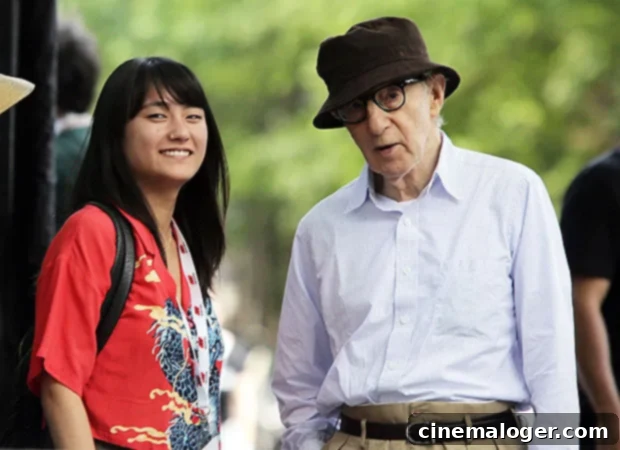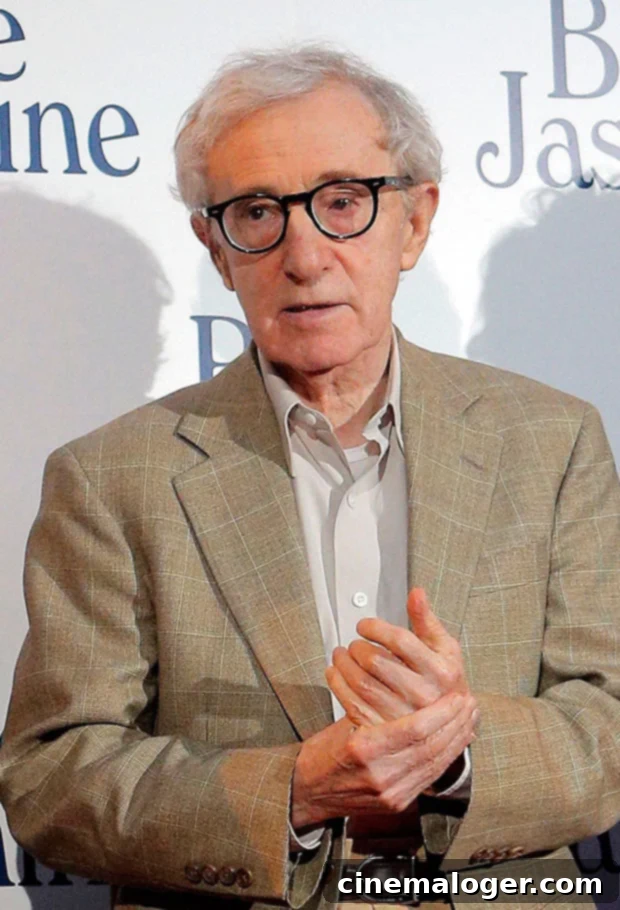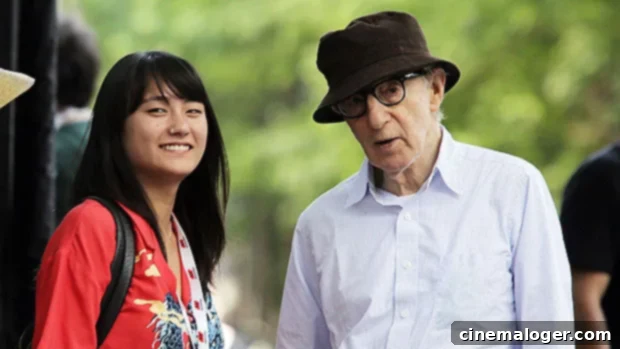Woody Allen Denies Dylan Farrow Abuse Allegations in Unprecedented Interview Amidst Docuseries Release
A never-before-seen interview from July 2020 with acclaimed director Woody Allen has recently come to light, featuring the filmmaker directly addressing the long-standing allegations of sexual assault brought against him by his adopted daughter, Dylan Farrow. This candid conversation with CBS Sunday Morning, conducted by journalist Lee Cowan, was broadcast for the very first time to coincide with the highly anticipated release of the four-part HBO docuseries, Allen v. Farrow. The airing of this interview and the docuseries has once again thrust the decades-old controversy back into the public eye, prompting renewed discussions and scrutiny over the serious claims.
Throughout the interview, Woody Allen steadfastly maintained his innocence, vehemently denying the claims that he abused Dylan when she was just seven years old in 1992. “Nothing that I ever did with Dylan in my life could be misconstrued as that,” he asserted, echoing a defense he has consistently put forth over the years. His insistence on his innocence forms the core of his public statements regarding the matter, and this interview provided a fresh platform for him to articulate his perspective directly to a wide audience.

Woody Allen during his 2020 interview, addressing long-standing allegations and maintaining his innocence.
Addressing the inherent implausibility he perceives in the allegations, the 85-year-old director questioned the logic of the accusations. “Why would a guy who’s 57 years old? I never was accused of anything in my life, I’m suddenly going to drive up in the middle of a contentious custody fight at Mia [Farrow]‘s country home (with) a seven-year-old girl?” Allen posed to Lee Cowan, highlighting the context of a bitter custody battle between him and his then-estranged partner, Mia Farrow. He continued, stating, “It just – on the surface, I didn’t think it required any investigation, even.” This statement underscores his belief that the allegations were so “preposterous” they should have been dismissed immediately without deep scrutiny, suggesting they were a tactic employed during the deeply contentious custody dispute.
Allen expressed profound frustration that despite numerous investigations over the years, which he claims found no credible evidence against him, the “smear has remained.” He lamented that a significant portion of the public still chooses to “cling to if not the notion that I molested Dylan, the possibility that I molested her.” This sentiment reveals his ongoing struggle with public perception and the lasting impact of the allegations on his reputation and career, asserting once more, “Nothing that I ever did with Dylan in my life could be misconstrued as that.” His consistent reiteration of this denial aims to firmly establish his position against the enduring accusations.

The director elaborating on his perspective during the discussion, maintaining a firm stance on his innocence.
Woody Allen on Dylan’s Belief: A Nuanced Perspective?
In a rather surprising turn within the interview, the director, often accused of manipulating narratives, offered a nuanced take on Dylan Farrow’s claims. Despite previously alleging that Dylan was coached by her mother, Mia Farrow, Allen stated in the interview that he does not believe Dylan herself was “lying.” He clarified his position: “I believe she thinks it. She was a good kid. I do not believe that she’s making it up. I don’t believe she’s lying. I believe she believes that.” This distinction suggests that while Allen denies the events ever occurred, he posits that Dylan genuinely believes they did, perhaps implying a form of instilled memory, suggestion, or misunderstanding rather than outright fabrication on her part. This complex perspective highlights the deep psychological layers involved in the case and the different ways individuals can interpret and remember past events, adding another dimension to the contentious debate.
Dylan Farrow’s Account and the Docuseries Impact
The timing of Woody Allen’s interview is inextricably linked to the buzzy four-part HBO docuseries, Allen v. Farrow, which provides an extensive platform for Dylan Farrow, Mia Farrow, and other family members to share their perspectives. In the docuseries, Dylan vividly recounted the “intense” and “grueling” evaluations she underwent as a child following her initial allegations. She revealed the harrowing experience of being interviewed nine times over three months, a process that subjected her to immense pressure, repeated questioning, and relentless scrutiny. Her testimony shed light on the profound difficulties children often face when trying to articulate traumatic experiences to adults, especially under legal and psychological examination, where every word can be scrutinized and dissected.
Dylan described the impossible bind she found herself in during these evaluations, a situation that epitomizes the challenges faced by many child witnesses: “If I change a word here, they say I’m being inconsistent, if I’m using the same exact words I used every other time, I was coached.” This statement powerfully conveys the no-win scenario many child witnesses encounter, where their genuine recollection can be weaponized against them regardless of how it is presented. The docuseries aimed to humanize Dylan’s experience, providing a detailed narrative from her point of view, complete with never-before-seen home videos, previously undisclosed court documents, and new interviews with family members and experts, offering a comprehensive look at her side of the story.
Mia Farrow and Dylan’s Enduring Bond
The HBO docuseries also delved into the complex and often painful relationship between Mia Farrow and Dylan, particularly in the aftermath of the allegations and the ensuing public storm. In one poignant moment during an episode, Mia asked her daughter a profound question that many might wonder: if she was “angry” with her mother for “somehow letting this happen,” by “bringing this person in the house… into [our] family.” Dylan’s response to her mother was emotionally resonant and deeply affirming, expressing her steadfast loyalty and appreciation for Mia’s unwavering support: “Whatever other mistakes you made I just feel like you were there when it mattered.” This exchange highlighted the immense emotional toll on the family and Dylan’s recognition of her mother’s crucial advocacy during a deeply challenging and isolating period.
The narrative presented in Allen v. Farrow consistently portrays Mia Farrow as a protective mother who stood by her daughter through thick and thin, often at significant personal and professional cost. It extensively explores the profound impact of Woody Allen’s relationship with Soon-Yi Previn, Mia Farrow’s adopted daughter, on the family dynamic, framing it as a profound betrayal that further complicated the emotional and psychological environment in which the allegations against Allen emerged. The docuseries serves as a powerful counter-narrative to Woody Allen’s consistent denials, offering a deeply personal, emotional, and meticulously constructed account from those who allege to be his victims and their staunch supporters, thereby intensifying the public debate.
The Enduring Controversy and Cultural Impact
The re-emergence of Woody Allen’s interview and the highly publicized release of Allen v. Farrow underscore the enduring and deeply polarizing nature of this high-profile controversy. For decades, the allegations have cast a long shadow over Allen’s illustrious filmmaking career, significantly impacting his reputation, legacy, and, more recently, his ability to secure distribution deals and funding in an increasingly sensitive Hollywood landscape. The cultural conversation surrounding the case has evolved significantly, particularly in the era of the #MeToo movement, which has empowered survivors of sexual abuse to come forward with their stories and has led to a widespread re-evaluation of public figures accused of misconduct, regardless of their past achievements.
While Woody Allen steadfastly maintains his innocence, consistently citing repeated investigations that did not lead to criminal charges, the court of public opinion remains deeply and often bitterly divided. The docuseries explicitly aimed to present a comprehensive look at the evidence from the perspective of Dylan Farrow and her family, meticulously challenging the long-standing narrative that Allen’s innocence was definitively proven or that the allegations lacked credibility. This ongoing debate reflects broader societal questions about accountability, the reliability and interpretation of child testimony, the influence of power dynamics inherent in celebrity cases, and the complex nature of truth in highly contested family disputes.
Ultimately, the 2020 interview serves as a critical document in the annals of this controversy, providing Woody Allen’s direct, unequivocal, and updated denials. Yet, its release alongside the potent and emotionally charged narrative of Allen v. Farrow ensures that the allegations against him, and the powerful testimonies of Dylan and Mia Farrow, continue to resonate deeply within the public consciousness. The complex saga of Woody Allen and Dylan Farrow remains an unresolved, multifaceted chapter in contemporary cultural history, leaving individuals to grapple with conflicting narratives and form their own difficult conclusions on a profoundly challenging truth.
